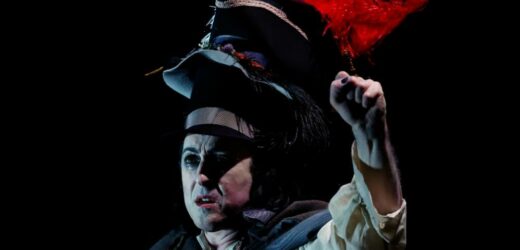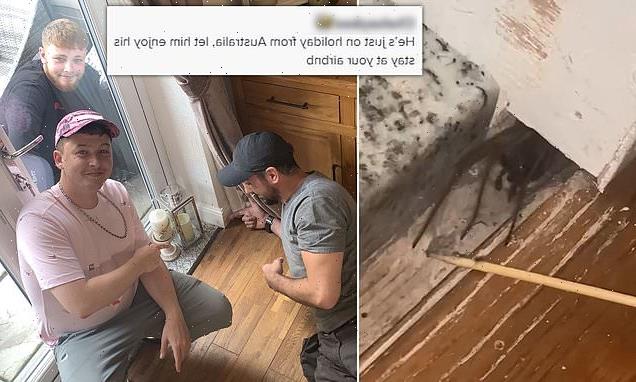Two years ago, the Edinburgh Festival — comprised of film and TV events but dominated by the much larger Fringe festival — was entirely canceled by COVID. In 2021, it returned in a much truncated edition that was a hybrid of live and online performances.
This year, which is the 75th anniversary of the Fringe’s founding, it has roared back to nearly full strength, at least from the point of view of performances seeking to find an audience. (There are some 3,582 shows to choose from, playing at 277 different venues.)
It was at the Edinburgh Festival in 1969 that Ian McKellen, then 30, first made his mark playing Richard II in a performance that the then-Sunday Times critic Harold Hobson called “the uncontested triumph” of that year’s festival; now, more than half a century later, and aged 82, he is back on the Fringe, still pushing personal boundaries as he appears in a 75-minute danced version of “Hamlet,” performing five soliloquies from the play while dancers, choreographed by Peter Schaufuss — who in the 1980s was director of London Festival Ballet (since rebranded the English National Ballet) — enact them physically.
It has also, incidentally, set a new precedent on the Fringe, picking up on Broadway and the West End’s indulgence of premium pricing that sees VIP packages being offered that include reserved priority seating and a champagne after-party, selling at over $127 each. Now the one percenters are taking over the Edinburgh Fringe, what could become of it?
McKellen is not the only headliner venturing into dance at this year’s festival. Alan Cumming — the Scottish-born screen and stage star now resident in New York — also returned to Edinburgh with a solo performance show called “Burn,” celebrating the true character of Scotland’s national bard Robert Burns, co-produced by the Edinburgh International Festival, the National Theatre of Scotland, and New York City’s The Joyce Theater (where it transfers for a run from Sept. 20-25).
Choreographed by Steven Hoggett (“Harry Potter and the Cursed Child,” “Once”), Cumming told The Scotsman newspaper: “I feel that I’ve always wanted to be a dancer, which I’ve done quite a lot over the years, but never anything like this show. I was 50 when I finished ‘Cabaret’ on Broadway the last time. It felt terrible that I wasn’t going to be that fit again and my body wasn’t going to be asked to do anything like that again.” So he’s taken up the challenge with this show, and says: “I’m not a conventional dancer. I’m not good at doing it the same as anybody else. I can obviously move and dance but like the other things I do in my life, I do it in my own way.”
Doing things their own way, whatever way that might be, is not always possible today, as controversial comedian-magician Jerry Sadowitz found out to his cost. With a show that lived up to its title, “Not for Everyone,” and warned in its publicity materials that it was a mixture of “highly offensive stand-up and sleight of hand skills” — some members of the audience at his first (and only) performance at the Pleasance were said to have been made to feel “uncomfortable and unsafe,” which led the venue to cancel a subsequent show.
The venue’s director Anthony Alderson commented, “The Pleasance is a venue that champions freedom of speech and we do not censor comedians’ material,” before completely contradicting himself: “The material presented at his first show is not acceptable and does not align with our values. This type of material has no place on the festival.”
Sadowitz himself responded with a statement in which he said: “While I don’t always get it right, especially at the speed of which I speak… and I don’t always agree with my own conclusions (!)… I am offended by those who, having never seen me before, HEAR words being shouted in the first five minutes before storming out without LISTENING to the material which I am stupid enough to believe is funny, sometimes important and worth saying.”

That at least would have been true to the spirit of adventure and risk that Edinburgh used to be so good at accommodating, but appears to be no longer capable of embracing. In fact, accommodation itself is proving to be the crisis point, for performers and audiences alike: With rents in the city for festival accommodation reported to have doubled in price since 2019, there are accounts of performers taking to sleeping in tents and caravans on campsites, often far from the city centre.
William Burdett-Coutts, founder and artistic director of one of the Fringe’s largest multi-venue chains, Assembly Theatre, which includes the Assembly Rooms in the heart of the New Town plus six other venues elsewhere, warned in a speech at a gala to celebrate its 40th anniversary that “the future of the event is threatened by accommodation prices.” He called for a “serious debate about how this all works and how to find solutions to the problems faced by this festival.”
In another interview, Burdett-Coutts advocated a more radical solution to the problems of the increasing commercialization and corporatization of the Fringe: “Drop a bomb on the whole thing and start again,” he told veteran fringe journalist Kate Copstick. As she went on to comment, “There has NEVER been a Fringe so beset with bad feeling, official complaints from professional bodies, online activism and widespread criticism of the Fringe Society from every level of The Fringe itself.”
Audiences, this reporter included, have reduced the length of their Edinburgh visits to lower the costs associated with being there, which means, of course, seeing far fewer shows and spending both less time and money in the city. Notwithstanding the corners I cut, my three-night stay cost me close to $1,200, and that’s before buying any theater tickets (my press credentials took care of most of them). By contrast, I took a seven-night holiday on Spain’s Costa Brava in June, and with flights and half-board accommodation included at a four-star hotel near a beach with golden sands, it cost me less than $500.
But you can’t put a price on the joy of making a discovery, though trying to do so can sometimes seem like looking for a needle in a haystack. Nevertheless, in my brief stay I saw at least two truly unmissable shows that made it all worthwhile, plus revisited two others I’d seen earlier in their creative development that have now realized their full potential.
The biggest thrill for me — but also one of the single most harrowing shows I’ve ever experienced — was director Ivo van Hove’s stage adaptation of Hanya Yanagihara’s “A Little Life,” which was an International Theater Amsterdam production imported to the Fringe for just three performances. Dutch actor Ramsey Nasr’s fearlessly intense portrayal of Jude, the victim of long-term childhood sexual abuse, is stunning, and van Hove’s production is at once shockingly intimate and intricate in laying out the consequences on the adult character, beloved by his close group of friends but emotionally unreachable.
Elsewhere, one-person comedy shows and plays featuring solo actors dominated the schedules, partly out of cost: It is cheaper for producers if they’re not accommodating a crowd, and since many shows are self-produced, they keep the attention on the one person they can both rely upon and want to promote. The best one of these that I saw was the dazzlingly original Colin Hoult, whose “The Death of Anna Mann” sees him create a character as fully rounded as Barry Humphries’ Dame Edna Everage; it is transferring for a brief (and already sold out) run at Soho Theatre from Oct. 11-15.
Also earning a direct West End transfer is Rob Madge’s autobiographical “My Son’s A Queer (But What Can You Do?),” that chronicles their childhood (with the help of original home videos from the ’90s) from a theater-obsessed kid putting shows in their living room to playing Gavroche in the 25th anniversary “Les Miserables”; this gloriously affirmative show, in which their passions are embraced and celebrated by their parents and close family, will move to the Garrick for a run from Oct. 21-Nov. 6. I’d seen this show when it first premiered at South London’s Turbine Theatre in 2021, and its development has paid off.
Likewise, fellow theater critic and journalist Tim Walker, whose debut play “Bloody Difficult Women” was premiered at London’s Riverside Studios earlier this year, became an Edinburgh hit this year as one of the few truly substantial original plays to feature more than a single actor.
A documentary-like play based on the legal challenge that Mrs. Gina Miller brought against former U.K. prime minister Theresa May that forced her to get parliamentary approval to trigger Article 50 to leave the EU, it plays with the intensity — and gravity — of a legal thriller, one that has had real-life consequences for the governance of the U.K.. There’s currently a logjam of shows circling the West End’s limited stock of available theaters, just as there routinely is on Broadway, but this is a play that deserves a return life.
Meanwhile, “Choir of Man,” a pop karaoke show set in a cosy pub, was an Edinburgh hit in 2021 which subsequently went to London’s Arts; it was back for another bite of festival audiences this year, and will once again be seen at the Arts from Oct. 1. I am keeping an eye on other Edinburgh hits likely to turn up in London now, like Marcelo Dos Santos’s play “Feeling Afraid As If Something Terrible Is Going to Happen,” in which Samuel Barnett (seen in the original West End, Broadway and film versions of Alan Bennett’s “The History Boys”) plays a stand-up comic who has never had a proper relationship, and has been talked up as another “Fleabag,” Phoebe Waller-Bridge’s frank show about another character’s failed sexual life.
The eight biggest fringe venues, who brought themselves together under a single promotional and sales website EdFest.com this year, announced that their final sales tally was expected to be 1.5 million tickets this year, compared with close to 2 million in 2019. A spokesperson commented: “The forecast number of tickets we’ve collectively sold is down 25% compared to 2019, which is a major threat for everyone involved in the festival.”
That existential threat has been reflected by the Fringe Society’s chief executive Shona McCarthy, who said as the Fringe ended on Aug. 29 that this year’s festival “is the first step in what will be a long road to recovery and renewal.”
“The eyes of the world look to this historic city every August, and we need to work together to ensure the Fringe is the best place for creatives to express their ideas, audiences to support them and for people across the sector to develop their skills and careers for the next 75 years,” said McCarthy.
(Pictured: Alan Cumming in “Burn”)
Read More About:
Source: Read Full Article


